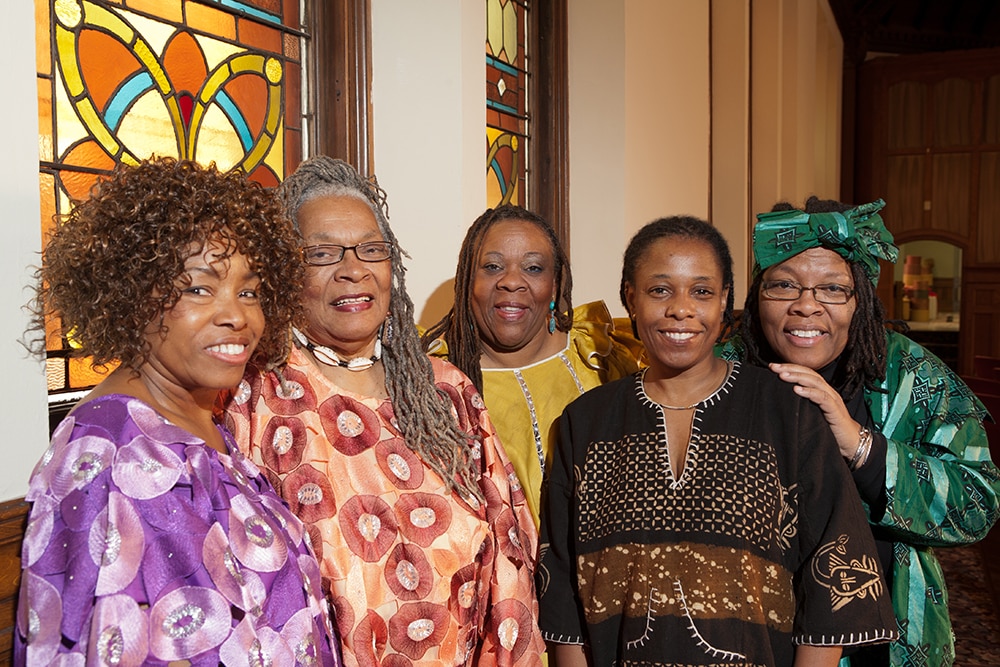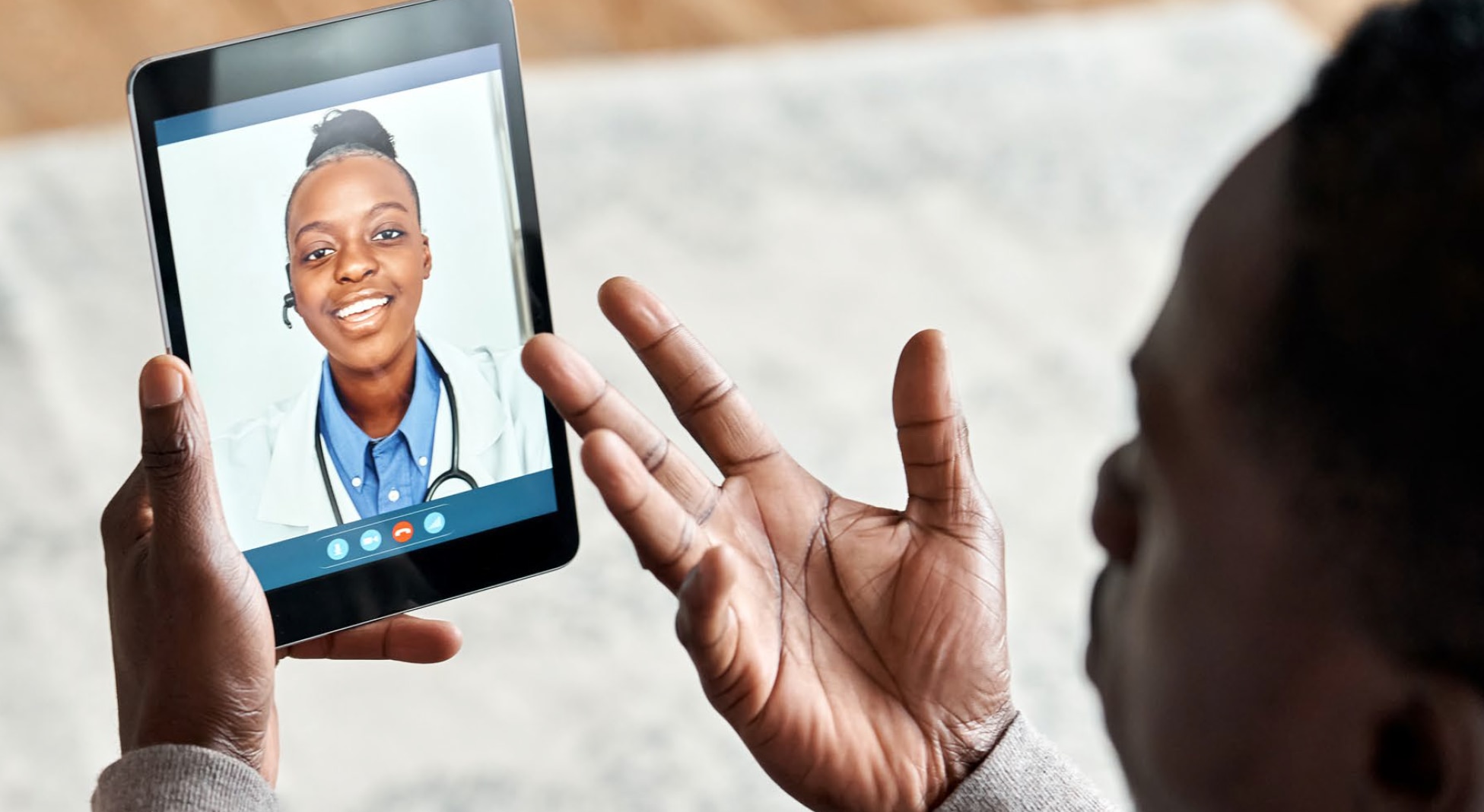
Engaging Black women in discussions about HIV care.
The Ryan White HIV/AIDS Program Approach to Reducing Health Disparities through HIV Care and Treatment
Reducing HIV-related disparities through HIV care and treatment services is a guiding principle and major focus of the Ryan White HIV/AIDS Program (RWHAP) toward ending the HIV epidemic in the United States. The 2022 National Ryan White Conference on HIV Care & Treatment theme, “The Time Is Now: Harnessing the Power of Innovation, Health Equity, and Community to End the HIV Epidemic,” reflects the need to address and reduce HIV health disparities; deliver innovative HIV care and treatment to people with HIV; and ensure that the HIV community is supported and involved in the planning, development, and implementation of HIV care and treatment strategies.
The urgency to end the HIV epidemic in the United States while addressing health disparities and improving health outcomes is also a focus of the National HIV/AIDS Strategy for the United States 2022–2025 (the Strategy). Both the Health Resources and Services Administration’s (HRSA) HIV/AIDS Bureau (HAB) and the Strategy recognize that reducing health disparities involves concentrating efforts on those populations not yet successfully maintained in HIV care, supporting racial justice, stopping HIV-related stigma and discrimination, providing leadership and opportunities for people with or at risk for HIV, and addressing social determinants of health and co-occurring conditions among people with HIV.
In 2022, RWHAP launched or enhanced initiatives, including several Part F Special Projects of National Significance (SPNS) initiatives and best practices, that align with the Strategy to reduce HIV health disparities. The following RWHAP initiatives focus on aging, telehealth, and housing; engagement through communities of practice; evidence-informed interventions; and the response to the mpox public health emergency.
Part F: Special Projects of National Significance Initiatives
Emerging Strategies to Improve Health Outcomes for People Aging with HIV. Using the HRSA HAB implementation science framework, this SPNS initiative is focusing on emerging interventions that address the health care needs and outcomes of people with HIV aged 50 years and older. These interventions aim to screen and manage comorbidities, geriatric conditions, behavioral health, and psychosocial needs of people aging with HIV. The SPNS initiative also is focusing on assessing the adoption and integration of these implementation strategies, understanding and documenting broader contextual factors affecting implementation, evaluating the impact of the emerging strategies, and disseminating the emerging strategies.

Telehealth appointment with health care provider and patient.
Telehealth Strategies to Maximize HIV Care. This SPNS initiative is focusing on identifying and maximizing the use of effective telehealth strategies to improve linkage to care, retention in care, and health outcomes, including viral suppression, among RWHAP clients. The initiative builds on existing programs and will also include creating an inventory of project strategies and tools, providing technical and capacity-building assistance, assessing implementation strategies, disseminating products developed by the initiative, and evaluating the initiative using an implementation science framework.
Supporting Replication (SURE) of Housing Interventions in the Ryan White HIV/AIDS Program. This SPNS initiative is focused on adapting and implementing housing-related interventions and strategies to support three key populations of people with HIV who experience unstable housing: (1) lesbian, gay, bisexual, transgender, and queer or questioning people; (2) youth and young adults (aged 13–24 years); and (3) people who have been impacted by the carceral system. As part of the initiative, an implementation and technical assistance provider is funding implementation sites, providing implementation-related technical assistance to the sites, and developing a communication plan and tools for widespread adoption of these housing-related intervention strategies for the three key populations. An evaluation provider will develop and implement a multisite evaluation of these intervention strategies and provide evaluation-related technical assistance using an implementation science framework.
RWHAP Efforts to Address HIV Health Disparities
Enhancing HIV Care of Women, Infants, Children, and Youth by Building Capacity Through Communities of Practice. This initiative, launched in 2022, will use a collaborative communities of practice framework to bring RWHAP Part D recipients together to learn from one another and from recognized experts through three, 12-month learning systems. Using a communities of practice platform, a select group of recipients, partners, and providers will share challenges, lessons learned, and information on best practices related to the following focus areas: preconception counseling, trauma-informed care, and youth transition into HIV adult care. Communities of practice participants will also exchange information on scaling up and disseminating focus area interventions and strategies to enhance the HIV care of people with HIV and their affected family members, as well as to improve their health outcomes.

Supporting Black men who have sex with men with HIV care and treatment.
Using Evidence-Informed Interventions to Improve Health Outcomes Among People Living with HIV (E2i). In 2022, HRSA HAB completed the SPNS initiative, known as E2i, which supported the implementation and evaluation of 11 evidence-informed interventions to reduce HIV-related health disparities and improve outcomes for people with HIV, including retention in care, treatment adherence, and viral suppression. The interventions focused on improving health outcomes among transgender women with HIV and Black men who have sex with men with HIV; integrating behavioral health with primary medical care for people with HIV; and identifying and addressing trauma in people with HIV. To support RWHAP and other HIV service delivery organizations in adapting and implementing the interventions, the E2i initiative produced and disseminated interactive toolkits, including implementation guides, interactive training modules, and videos.
Responding to Mpox Public Health Emergency. Since the beginning of the mpox (formerly known as monkeypox) outbreak, which was declared a public health emergency in August 2022, HRSA HAB has worked with federal partners across the U.S. Department of Health and Human Services, including the Centers for Disease Control and Prevention (CDC), to provide information and resources to prevent the spread of the disease, help health care providers who are treating patients with mpox, support mpox vaccine distribution, and ensure that those most impacted are at the focus of HAB’s response efforts. A variety of resources are available on the RWHAP mpox information webpage, including press releases, fact sheets, webinars, videos, and frequently asked questions, as well as resources from the CDC and other federal partners.
RWHAP Best Practices Compilation. This RWHAP knowledge-sharing tool gathers and disseminates successful intervention strategies that were implemented in RWHAP-funded settings to improve the health outcomes of people with HIV and contribute to ending the HIV epidemic in the United States. Program recipients and subrecipients can use the tool to learn about strategies that have worked in other RWHAP settings and find inspiration and new ideas to adopt for improving the care of people with HIV. Interventions can be searched by evidence category, such as emerging interventions, focus population, HIV care continuum stage (e.g., viral suppression), setting (e.g., state health department), priority funding by RWHAP Part, and Ending the HIV Epidemic in the U.S. strategy. The Best Practices newsletter offers monthly information on intervention profiles recently added to the Compilation as well as new resources to help recipients use the tool.
 Health Resources & Services Administration
Health Resources & Services Administration

